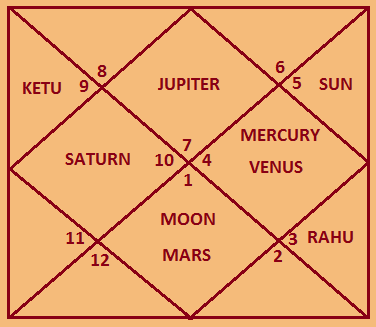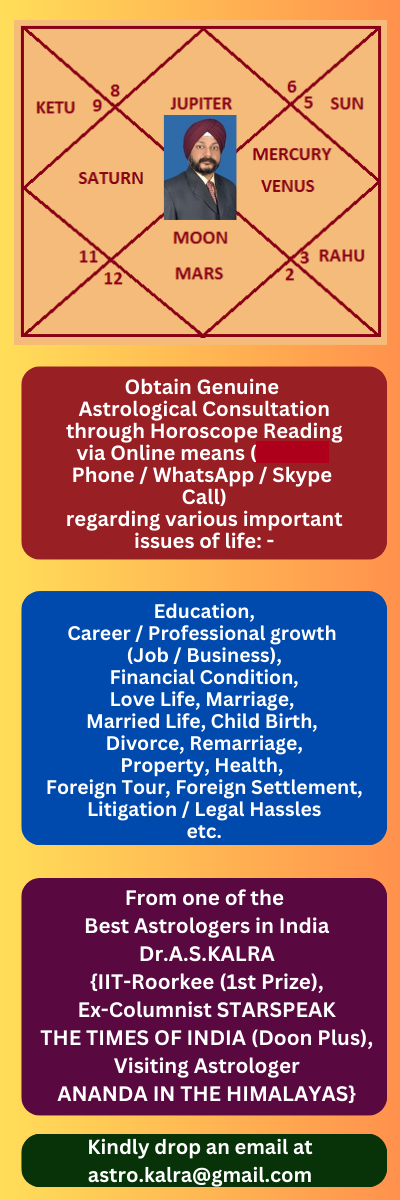Love Marriage vs Arrange Marriage



Arrange Marriage vs Love Marriage
By: - Dr.A.S.Kalra Astrologer
Love Marriage or Arranged Marriage: -
According to Dr. A.S. Kalra, the success of a marriage, whether it is a love marriage or an arranged marriage, is what truly matters. The debate about which type of marriage is better is not as important. Interestingly, statistics show that the divorce rate is higher in love marriages compared to arranged marriages. Western countries, where live-in relationships are more common, primarily have love marriages or a combination of love and arranged marriages. In these countries, the divorce rate is also considerably high. On the other hand, countries in the Indian subcontinent have a lower divorce rate compared to Western countries.Some young individuals believe that love marriages are better because they believe they can judge their partner before getting married. However, according to Dr. A.S. Kalra, true understanding of each other's nature, behavior, and characteristics can only occur after marriage when both partners start living together and face the challenges and responsibilities that come with married life.
It is important to note that individuals who have never been married cannot fully comprehend the true meaning of marriage until they experience it themselves. Many youngsters have the misconception that marriage is solely about romance and sex. Prior to marriage, both partners often strive to present their best selves and impress each other due to the fear of losing one another. However, after marriage, some couples may not prioritize each other to the same extent because the fear of losing one another diminishes. In many cases, marriage marks the end of a love story rather than the beginning.
The majority of youngsters aspire to have a love marriage because they find excitement in pursuing it, viewing it as an accomplishment in their lives. Some desire a love marriage to boast about it in society. Surprisingly, many of these couples begin to fight after marriage but maintain the facade of a happy couple in public or on social media platforms like Facebook.
In India, both love marriages and arranged marriages are prevalent, and the choice between the two depends on individual preferences, cultural norms, and societal influences. Here are some key points to understand about love marriages and arranged marriages in the Indian context:
Love Marriages:
Choice and Emotion: Love marriages occur when individuals choose their partners based on mutual affection, attraction, and emotional compatibility. The decision to marry is primarily driven by personal feelings and desires.
Independence and Autonomy: Love marriages are often associated with greater individual autonomy and independence in choosing a life partner. The couple takes the lead in the decision-making process and has a more prominent role in shaping their relationship.
Compatibility: Love marriages are based on the premise that partners have spent sufficient time getting to know each other, building a connection, and assessing their compatibility before deciding to marry. They often share common interests, values, and goals.
Social Acceptance: While love marriages have become more accepted and prevalent in India, they may still face certain challenges. Traditional families and conservative societies may have reservations about love marriages, particularly if they involve interfaith or inter-caste relationships.
Arranged Marriages:
Family and Social Factors: Arranged marriages are facilitated by families or trusted intermediaries who take the responsibility of finding a suitable partner based on factors such as caste, religion, social status, education, and family background. The focus is often on maintaining social harmony and upholding family traditions.
Commitment to Family: Arranged marriages emphasize the importance of family bonds and collective decision-making. The union is seen as not just a relationship between two individuals but as a joining of two families. Compatibility is assessed not only between the couple but also between their families.
Long-term Perspective: Arranged marriages are often considered to have a long-term perspective, as they prioritize stability, commitment, and shared values over immediate romantic love. The belief is that love can develop and grow over time as the couple nurtures their relationship.
Support System: In arranged marriages, families play an active role in providing guidance, support, and mediation if conflicts arise. They may offer advice and assistance in resolving challenges and adapting to married life.
It's important to note that the distinction between love marriages and arranged marriages is not always clear-cut, as there can be variations and overlaps. Modern Indian society is witnessing a gradual shift towards a more individualistic approach, and concepts like "love-cum-arranged" marriages are emerging, where individuals have a say in the partner selection process while considering their family's preferences.
Ultimately, the choice between love marriage and arranged marriage in India depends on the individuals involved, their values, and the level of influence from family and societal expectations.
